人教版英语八年级英语句型及语法(英语动词的时态)及答案百度文库
新人教版八年级上册英语时态练习题附答案

新人教版八年级上册英语时态练习题附答案Revised final draft November 26, 2020新人教版八年级上册英语时态精选练习题附答案L Li Ping often (read) English in the morning.2. he (clean) the windows once a week3.The workers (have) sports on the playground now.4.How long you _ (stay) there the day before yesterday?5.Who (listen) to the music?6.When I (be) a middle school student, I often __ (sing).7.His parents (go) to the Great Wall tomorrow morning.8. they (study) Japanese next term?9.What time you (do) your homework everyday.10.Look! The students (clean) the classroom.11.—What your after (do) yesterday?-He (write) two letters.12.There (be) a football match on TV this evening.13.My father (leave) for Japan tomorrow morning.14.Tom (not listen) to the radio every morning.15. (be) there any hospitals here twenty years ago?16.I (come) to see you again before long.17. there (be) an English evening next Saturday?18. your uncle (have) a meeting last Friday?19.What the young pioneers (do) on the hill now?20.They (not go) fishing on Sunday.21.How many classes you (have) every day?22.It1 s seven in the evening, Tom,s family (watch) TV.23.He (join) the army in 1985. He _ (be) still in the army now.24.I (visit) my friend next Sunday.25.If it snows tomorrow, we (play) with snow.26.I (make) a lot of mistakes in my test yesterday.27.— it (snow) outside now?-No, it .28.Where they (live) They (live) in Shanghai.29.If it (rain) this morning, we won' t go shopping.30.Listen! Who (sing) in the next room?31.The teacher (not teach)us a Chinese song, he (teach)us an English song two days ago.32.If I am free this evening, I _(help)you with your maths.33.- you (be) there tomorrow?-No, I .34.Where (be) your parents last year They (be) in Xi'an.35.—Why they (go)to the library after school yesterday?-Because they (want) to borrow some books.36.What you (do) these days?37.Don't make a noise. Grandma (sleep).38.Sometimes he (help)his mother with the housework.39.Please write to us as soon as you (get) there.40.We (show)the foreign friends around Beijing when they get here.41.We'll wait till you (make)up your mind.42.They just (talk) about you.43.—Where he (be)一He (be) to the bank.44._ you(visit) the Science Museum?-Yes, I.45.—she (tell) you the good news?-N。
八年级下册语法4-动词的时态综合(有答案)人教版英语八升九暑假衔接

I.单项选择。
1.John usually _______ up at 6:00 am.A.getsB.gotC.is gettingD.will get2.-When _______ you _______Mary?-Yesterday afternoon.A.do;mectB.did;mectC.have;metD.are;mecting3.She_______dinner when I_______ her last night.A.is eating;calledB.was eating;calledC.cat;callD.was cating;call4.My sister _______ to the art museum next week.A.will goB.goC.goesD.wentrry _______ in the kitchen now.A.cooksB.was cookingC.is cookingD.cook6. She will tell me as soon as she _______ back.esB.will comeeD.came7.My parents _______ five countrics so far.A.visitB.visitedC.have visitedD.are visiting8.-What _______ you _______ at 8:00 last night?-I _______a shower.A.were; do; is takingB.were;did; was takingC.are;doing; is takingD.were;doing;was taking9.My grandfather always _______me stories before I go to sleep.A.tellB.tellsC.toldD.telling10.-What is your father doing?-He _______his car.A.is washingB.washedC.has washedD.washes11.-Have you ever been to the water park?-No. I_______ there with my cousin tomorrow.A.goB.wentC.goesD.will go12.I _______ the car last year.I_______ it for a year.A.bought; hadB.bought;have hadC.buy;have hadD.buy;bought13.There _______ a basketball game in our school this Friday.A.will haveB.wasC.hasD.will be14.When I was young,I_______ to school every day.A.walkedB.was walkingC.have walkedD.walk 15-Sue went to the cinema at 8:30 last night.-It's impossible, She _______ her homework with me at that time.A.didB.was doingC.has doneD.does II.用所给动词的适当形式填空。
人教版英语初二英语过去完成时知识点总结附答案百度文库

人教版英语初二英语过去完成时知识点总结附答案百度文库一、初中英语过去完成时1.The bus ______ for five minutes when Tim arrived at the station.A. wentB. has leftC. had leftD. had been away【答案】D【解析】【分析】句意:当迪姆到达车站时,公交离开了五分钟了。
表示到达车站前已经发生或完成的动作,句子用过去完成时态;leave是一个非延续性的动词,不能与表示一段时间的状语for…连用,可以表达成be away,形容词表示状态,可以与表示一段时间的状语连用。
故选D。
【点评】本题考查过去完成时以及延续性动词的用法。
2.Mary thought of the party which she___________ for this day.A. planB. plannedC. had plannedD. would plan【答案】 C【解析】【分析】句意:玛丽想起了她今天计划的聚会。
plan的动作发生在thought of的动作之前,表示过去的过去,要用过去完成时had+过去分词。
故选C。
【点评】考查过去完成时的构成和用法。
注意过去完成时表示过去的过去含义。
3.—Did you see Tom at the party?—No, he _________ by the time I got there.A. leftB. was leavingC. had leftD. has left【答案】 C【解析】【分析】句意:——在聚会时你见了汤姆了吗?——没有,我到达的时候他已经离开了。
got,一般过去时,离开在到达之前已经发生了,因此使用过去完成时,故答案是C。
【点评】考查过去完成时,注意过去完成时表达的是过去的过去。
4.By the end of last year they _________ thousands of orange trees on the mountains. A. had planted B. have planted C. were planting D. would plant【答案】 A【解析】【分析】句意:到去年末,他们已经在山上种植了上万棵橘子树。
八年级英语语法大全(句子成分、基本句型、宾语从句、现在进行时、时态)
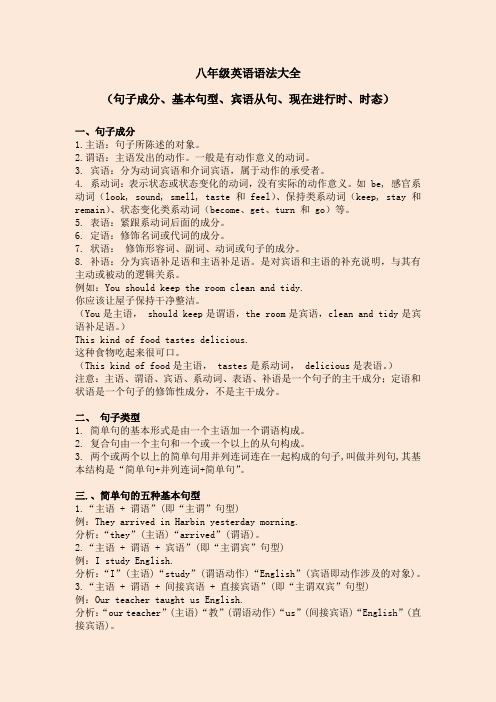
八年级英语语法大全(句子成分、基本句型、宾语从句、现在进行时、时态)一、句子成分1.主语:句子所陈述的对象。
2.谓语:主语发出的动作。
一般是有动作意义的动词。
3. 宾语:分为动词宾语和介词宾语,属于动作的承受者。
4. 系动词:表示状态或状态变化的动词,没有实际的动作意义。
如 be, 感官系动词(look, sound, smell, taste 和 feel)、保持类系动词(keep, stay 和remain)、状态变化类系动词(become、get、turn 和 go)等。
5. 表语:紧跟系动词后面的成分。
6. 定语:修饰名词或代词的成分。
7. 状语:修饰形容词、副词、动词或句子的成分。
8. 补语:分为宾语补足语和主语补足语。
是对宾语和主语的补充说明,与其有主动或被动的逻辑关系。
例如:You should keep the room clean and tidy.你应该让屋子保持干净整洁。
(You是主语, should keep是谓语,the room是宾语,clean and tidy是宾语补足语。
)This kind of food tastes delicious.这种食物吃起来很可口。
(This kind of food是主语, tastes是系动词, delicious是表语。
)注意:主语、谓语、宾语、系动词、表语、补语是一个句子的主干成分;定语和状语是一个句子的修饰性成分,不是主干成分。
二、句子类型1. 简单句的基本形式是由一个主语加一个谓语构成。
2. 复合句由一个主句和一个或一个以上的从句构成。
3. 两个或两个以上的简单句用并列连词连在一起构成的句子,叫做并列句,其基本结构是“简单句+并列连词+简单句”。
三.、简单句的五种基本句型1.“主语 + 谓语”(即“主谓”句型)例:They arrived in Harbin yesterday morning.分析:“they”(主语)“arrived”(谓语)。
人教版英语八年级上英语动词的时态复习总结含答案推荐精选
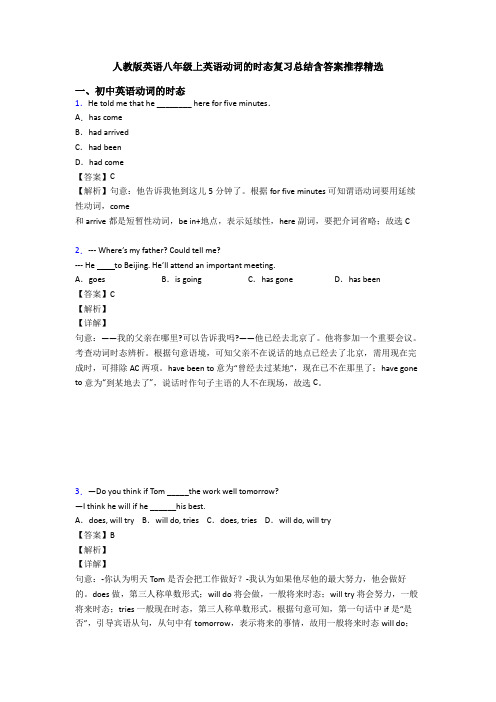
人教版英语八年级上英语动词的时态复习总结含答案推荐精选一、初中英语动词的时态1.He told me that he ________ here for five minutes.A.has comeB.had arrivedC.had beenD.had come【答案】C【解析】句意:他告诉我他到这儿5分钟了。
根据for five minutes可知谓语动词要用延续性动词,come和 arrive都是短暂性动词,be in+地点,表示延续性,here副词,要把介词省略;故选C2.--- Where’s my father? Could tell me?--- He to Beijing. He’ll attend an important meeting.A.goes B.is going C.has gone D.has been【答案】C【解析】【详解】句意:——我的父亲在哪里?可以告诉我吗?——他已经去北京了。
他将参加一个重要会议。
考查动词时态辨析。
根据句意语境,可知父亲不在说话的地点已经去了北京,需用现在完成时,可排除AC两项。
have been to意为“曾经去过某地”,现在已不在那里了;have gone to意为“到某地去了”,说话时作句子主语的人不在现场,故选C。
3.—Do you think if Tom _____the work well tomorrow?—I think he will if he ______his best.A.does, will try B.will do, tries C.does, tries D.will do, will try【答案】B【解析】【详解】句意:-你认为明天Tom是否会把工作做好?-我认为如果他尽他的最大努力,他会做好的。
does做,第三人称单数形式;will do将会做,一般将来时态;will try将会努力,一般将来时态;tries一般现在时态,第三人称单数形式。
人教版英语八年级上册时态专项练习(附答案)

人教版英语八年级上册时态专项练习(附答案)一、选择填空。
1. A: Is Jane at home?B: I'm not sure. She ________ (visit) her grandparents today.答案:is visitingB: Sorry, I can't. I have to study for my exam.3. A: How long ________ (you/live) in New York?B: I ________ (live) here for three years.答案:have you lived, have lived4. A: ________ (you/go) to the concert tomorrow?B: No, I ________ (not/buy) a ticket yet.答案:Are you going, haven't bought5. A: When ________ (he/arrive) at the airport?B: He ________ (arrive) at 10:00 am.答案:did he arrive, arrived二、根据句意再写出一个与之意思相近的句子。
1. They have finished their homework.答案:Their homework is done.2. We are going to visit the Great Wall next week.答案:Next week, we will visit the Great Wall.3. Tom often reads books in the library.答案:Reading books in the library is often done by Tom.4. She didn't go to bed until 11 o'clock last night.答案:She went to bed at 11 o'clock last night.5. My sister and I have studied English for two years.答案:My sister and I have been studying English for two years.三、改错。
(英语)初中英语动词的时态专题训练答案及解析

(英语)初中英语动词的时态专题训练答案及解析一、初中英语动词的时态1.Jack ______ a shower when his mother rang him up.A.takesB.has takenC.is takingD.was taking【答案】D【解析】句意:当他妈妈给他打电话的时候杰克正在洗澡。
本句考查过去进行时态。
“他妈妈打电话”是过去的时间,在过去某个时间正在进行的动作,使用过去进行时,故选D。
2.—My grandma looking at that photo on the wall.—I can understand. It helps her remember her childhood.A.enjoys B.enjoyedC.was enjoying D.will enjoy【答案】A【解析】句意:——我奶奶喜欢看墙上的那个照片。
——我能理解,它能帮她想起她的童年。
A. enjoys喜欢,用于一般现在时态,主语单三时; B. enjoyed 喜欢,用于一般过去时态;C. was enjoying 喜欢,用于过去进行时态,主语单三时;D. will enjoy喜欢,用于一般将来时态;根据It helps her remember her childhood.可知用一般现在时态;故选A3.-Has your cousin arrived in Beijing yet?--Yes. She Beijing since yesterday morning.A.arrived in B.has arrived in C.has been in D.has been to【答案】C【解析】句意:你表弟到北京了吗?-是的。
她从昨天起就在北京了。
since yesterday morning自昨天早晨以来,表示的是截止到目前为止的时间段,用于现在完成时态,排除A;arrived为短暂性动词,不能与表示一段的时间状语连用;have been to表示某人去过某地,也不能与表示一段的时间状语连用,故答案为C。
人教版八年级英语动词时态专项练习(含答案和解析)

一、选择题1.—Jimmy lost his key yesterday.—________? It’s his third time in just one month.A.Did he B.Was he C.Has he D.Does he2.--- David, ________. You fall asleep in class again!--- I’m sorry. I promise that I ________.A.wakes up; will B.wake up; will C.waking up; won’t D.wake up; won’t 3.Paul could be a very attractive boy but he ______ to his behaviour.A.paid no attention B.were paying no attentionC.pays no attention D.had paid no attention4.An increased concentration of carbon dioxide and certai n other gases in the Earth’s atmosphere ______ global warming.A.contributing to B.contribute toC.contributes to D.to contribute to5.My parents in Hong Kong. They were born there and have never lived anywhere else. A.live B.livedC.were living D.will live6.“81192”, the number of Wang Wei’s plane, ________ up on many Chinese media outlets to remind us of our hero on April 1 every year.A.showed B.showing C.to show D.shows7.- Work hard, Tom. And if you , you’ll succeed. - OK. I will.A.are B.do C.have D.will8.Not only my classmates but also our English teacher Chinese poems, so we often share their favourite ones.A.like B.liked C.likes D.liking9.—I’d like to borrow a book. Its name is “Travel around the world”.—Let me check on the computer first. Oh, it _____________ that Kate has got it.A.says B.is said C.has said D.was said10.--- Do you like the new pen?--- Yes, it _______ very well.A.is written B.writes C.is writing D.has written11.- Honey, this is a present for your birthday.- Ah! A pair of shoes, well-known-brand – Nike. I think it _______ comfortable:A.is worn B.wears C.is wearing D.has worn12.Our class _______ forty-five students, in other words, forty-five students ______ our class. A.consists of, are made up of.B.is consisted of, make up.C.consists of, make up.D.is consisted of, are made up of.13.—Madam, look at the sign. You are not allowed to sit in this game area for kids.—Sorry, I ________ it. I will go somewhere else.A.don’t notice B.didn’t notice C.haven’t noticed D.wasn’t noticed 14.—When are you leaving?—My plane _________ at six.A.took off B.is about to take offC.takes off D.will take off15.We’ll never forget the village in which there ________ a small hill and a beautiful l ake. A.used to be B.used to have C.was used to be D.was used to having 16.I________in London for over ten years, but I’ve never regretted my final decision to move back to China.A.was living B.would live C.lived D.have lived 17.— Why didn't you answer my call?— sorry. I _______ an old friend and we _______all the time.A.have met; are talking B.met; talked C.met; are talkingD.met; were talking18.—Have you ever visited Russia, Wilson?一Yes, I have. I _____ there last summer for two weeks.A.went B.was going C.have gone D.goes19.What a surprise to see you here! When ________ you ________ back here?A.do; get B.have; got C.did; get D.will; get 20.— Honey, what TV program are you watching?—I’m watching a documentary. It began at 6:00 p.m. and ________ on for one more hour. A.has been B.has lasted C.was D.will be 21.—What a pity! It's raining. Do we have to cancel the family trip?—No. As soon as the rain stops, we ___________out to have fun.A.go B.will go C.went D.have gone 22.—When ________ you ________ reading the book Little Women?—It's hard to say. I'm busy these days and have no time to continue reading.A.did; finish B.have; finished C.will; finish D.do; finish 23.—Excuse me, could you please tell me the way to Wanda Plaza?—Walk straight on, and you _____ it on your left.A.see B.saw C.will see D.have seen 24.—Jenny, you look busy recently.—I’m practising running these days. I the Nanjing Marathon this autumn.A.was taking part in B.has taken part inC.took part in D.will take part in25.—Have you ever been to Shanghai?—Of course. Actually, I ________ there for six years but now I live in Zhenjiang.A.worked B.was working C.would work D.have worked 26.This pen ______ so smoothly. I bought two packets for my son and his cousin.A.was written B.has been written C.is writing D.writes27.-Hi, Lucy! What's the schedule for tomorrow?-Let me check.You an appointment with Thomas at three o'clock.A.were having B.haveC.had D.have had28.Playing a role in the hit show “Daddy, Where Are We Going?”, Kimi, together with the other four kids, _______ popular with many teenagers now.A.is B.are C.was D.were29.The drama, “The Empress of China" that was pulled off the air for technical reasons now back on TV.A.is B.are C.has D.have 30.Typically, with high-status and well-paid jobs ________ far more pressure than assumed. A.are coming B.is coming C.come D.comes31.—I ________ so busily recently that I ________ no time to help you with your maths.—That’s OK. I can manage it by m yself.A.have been working; have B.have worked; hadC.am working; will have D.had been working; had had32.I table tennis so well; however, even so I lost the match with Ma Long yesterday. A.play B.have played C.played D.would play 33.Rent usually ________ up in the summer, when college graduates are moving out of their dormitories and seeking for new places to move in.A.will go B.goesC.has gone D.went34.—Why are you so upset?—I had my computer repaired yesterday, but it ________ work again.A.d oesn’t B.didn’tC.won’t D.wouldn’t35.Do you know what time _________?A.the train leave B.does the train leaveC.will the train leave D.the train leaves36.I like this silk dress and it ______ so soft and comfortable.A.is feeling B.feelsC.has felt D.is felt37.The Dragon Boat Festival ________ the beginning of the hottest season of the year.A.is marking B.marks C.will mark D.marked38.A new function of China’s official train ticket booking website ______to boost buyers’chances of obtaining a ticket during the upcoming Spring Festival travel rush.A.will be expected B.expects C.has been expected D.is expected 39.Theoretically, a good screwdriver should last a lifetime, but it rarely___________, usually because it is used at one time or another as ___________ some other tool.A.should, a favor for B.should, a lack ofC.does, a way of D.does, a substitute for40.The palace caught fire three times in the last century, and little of the original building________ now.A.is remained B.is remainingC.remains D.has been remained41.Due to the country’s growing rate of urbanization, China’s migrant population _______ to be over 200 million by 2020.A.predicts B.is predicted C.will have been predicted D.will be predicted42.The Spring Festival is the time of year that _____ the largest annual mass migration on the planet when one sixth of the world’s population _____ home.A.will see; travels B.saw; was travellingC.will be seeing; will be travelling D.sees; travel43.Professor Williams keeps telling his students that the future ___ to the well-educated. A.belongs B.is belongedC.is belonging D.will be belonged44.Experience is a hard teacher because she ________ the test first, the lesson afterwards. A.gives B.has given C.was giving D.would give45.In our hometown, about 1,500 meters east of my house,_______ an old temple_______ back to the 17th century.A.stands; dating B.is standing; datedC.standing; dated D.stand; dating46.Many gases in the atmosphere actually heat energy that escapes from the Earth’s surface back to the earth.A.finding; reflecting B.found; reflectedC.found; to reflect D.found; reflect47.I would be happier if you did more studying while you are free, but you ___________. A.don’t B.did n’t C.wouldn’t D.weren’t 48.Honesty ___________ an important role in a child’s ability to succeed in school and later life. A.played B.playsC.had played D.has played49.A long road tests a horse’s strength and a long-term task ________ a man’s heart. A.proves B.will prove C.is proving D.has proved 50.The classroom ________ by students every day.A.cleans B.cleanedC.is cleaned D.is cleaning【参考答案】***试卷处理标记,请不要删除一、选择题1.A【详解】句意:——Jimmy昨天丢了钥匙。
人教版八年级英语上册常用的时态复习(35张)
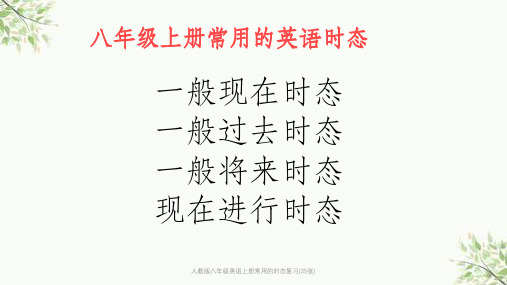
• The train leaves at 17:40.
会议在七点钟开始。
火车17:40离开。
人教版八年级英语上册常用的时态复习(35张)
一般现在时态的几点注意:
• 3)书报的标题、小说、戏剧、图片等情节介绍常用 一般现在时。例如:
• China Declares Manned Spaceflight Successful.
弗朗西斯穿过去,把球传给姚明,姚明跳起来,接住球投进篮里。
人教版八年级英语上册常用的时态复习(35张)
一般现在时态的几点注意:
• 4) 在由if, unless, even if ,so long as , as long as 等引导的 条件状语从句和在由when, before, after, until, till, as soon as, by the time, each time, the moment, immediately等引导的时间状语从句中,常用一般现在时表示 将来时间。例如:
• Please let me know immediately you get the results. 你一得到 结果,就请马上告诉我。
人教版八年级英语上册常用的时态复习(35张)
一般现在时态的几点注意:
• 5),还要注意其动词形式的变化。该时态主要由动词 原形表示,但第三人称单数后要加词尾-s或 -es,be 和have有特殊的变化形式, be (am, is , are) have( has ) 。例表如下:
人教版八年级英语上册常用的时态复习(35张)
一般现在时的几种主要用法
• 1)一般现在时表示客观事实、客观存在的普遍真理、 用于一般现在时的时间状语常见的有:often, usually,always,sometimes, seldom,ever, never,every day(week,month,year), once a year,now and them,from time to time。例如:
初中英语八大时态全套精讲及练习题(附答案)
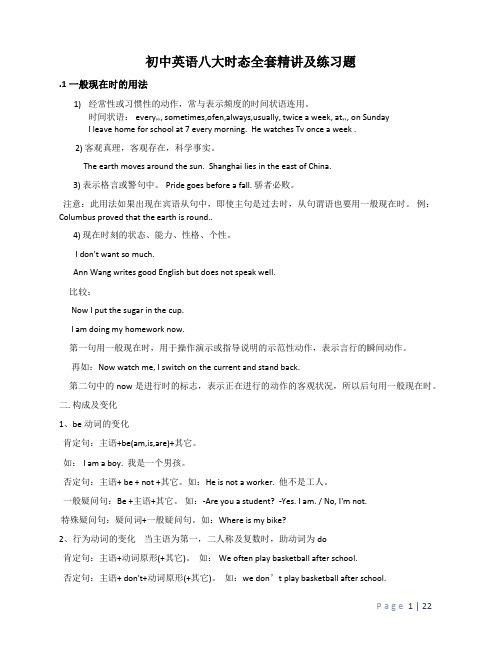
初中英语八大时态全套精讲及练习题.1 一般现在时的用法1)经常性或习惯性的动作,常与表示频度的时间状语连用。
时间状语: every…, sometimes,ofen,always,usually, twice a week, at…, on SundayI leave home for school at 7 every morning. He watches Tv once a week .2) 客观真理,客观存在,科学事实。
The earth moves around the sun. Shanghai lies in the east of China.3) 表示格言或警句中。
Pride goes before a fall. 骄者必败。
注意:此用法如果出现在宾语从句中,即使主句是过去时,从句谓语也要用一般现在时。
例:Columbus proved that the earth is round..4) 现在时刻的状态、能力、性格、个性。
I don't want so much.Ann Wang writes good English but does not speak well.比较:Now I put the sugar in the cup.I am doing my homework now.第一句用一般现在时,用于操作演示或指导说明的示范性动作,表示言行的瞬间动作。
再如:Now watch me, I switch on the current and stand back.第二句中的now是进行时的标志,表示正在进行的动作的客观状况,所以后句用一般现在时。
二. 构成及变化1、be动词的变化肯定句:主语+be(am,is,are)+其它。
如: I am a boy. 我是一个男孩。
否定句:主语+ be + not +其它。
如:He is not a worker. 他不是工人。
八年级英语句型及语法(英语动词的时态)及答案解析百度文库
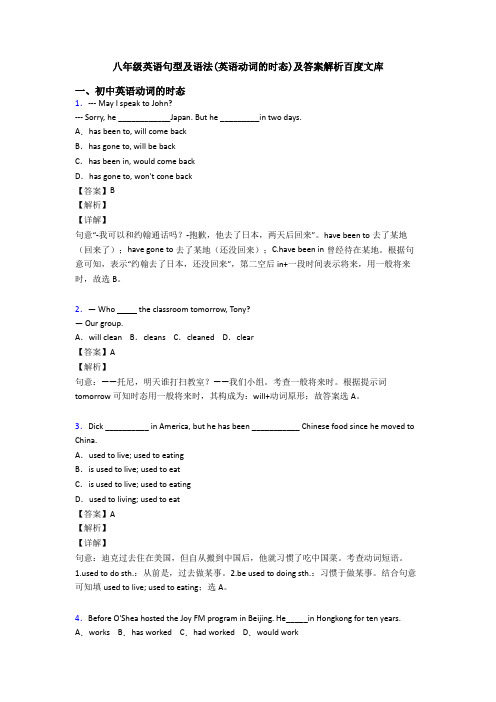
八年级英语句型及语法(英语动词的时态)及答案解析百度文库一、初中英语动词的时态1.--- May I speak to John?--- Sorry, he ____________Japan. But he _________in two days.A.has been to, will come backB.has gone to, will be backC.has been in, would come backD.has gone to, won't cone back【答案】B【解析】【详解】句意“-我可以和约翰通话吗?-抱歉,他去了日本,两天后回来”。
have been to去了某地(回来了);have gone to去了某地(还没回来);C.have been in曾经待在某地。
根据句意可知,表示“约翰去了日本,还没回来”,第二空后in+一段时间表示将来,用一般将来时,故选B。
2.— Who the classroom tomorrow, Tony?— Our group.A.will clean B.cleans C.cleaned D.clear【答案】A【解析】句意:——托尼,明天谁打扫教室?——我们小组。
考查一般将来时。
根据提示词tomorrow可知时态用一般将来时,其构成为:will+动词原形;故答案选A。
3.Dick __________ in America, but he has been ___________ Chinese food since he moved to China.A.used to live; used to eatingB.is used to live; used to eatC.is used to live; used to eatingD.used to living; used to eat【答案】A【解析】【详解】句意:迪克过去住在美国,但自从搬到中国后,他就习惯了吃中国菜。
初中英语 人教版八年级上册语法专项-一般将来时讲解+时态混合练习题(含答案)

一般将来时讲解与时态混合练习题“be going to+动词原形”是一般将来时的一种表达形式,表示将要发生的动作或情况,be动词随主语的人称和数的变化而变化。
1.肯定句:主语+be going to+动词原形+其他2.否定句:主语+be not going to+动词原形+其他.3.一般疑问句:Be+主语+going to+动词原形+其他?肯定回答:Yes,主+be.否定回答:No,主语+be not.4.特殊疑问句:疑问词+be+主语+going to+动词原形+其他?用法:(1)表示将要发生的动作或安排,或打算、计划、决定要做的事。
(2)表示主语根据当前的情况做出的预测。
通常是有迹象表明某事即将发生,表达说话人较肯定的判断,指即将发生或肯定要发生的事,常用于I'm sure,I'm afraid或I think等后面。
(3)常与be going to连用的时间状语be going to 表达的是未发生的动作,因此常与一些表示将来的时间状语连用。
例如:tomorrow,this evening,next month,in three weeks等。
有时也可与before, after等引导的时间状语从句连用。
一般将来时1)一般将来时的构成:1. 助动词will(shall)+动词原形2. am / is / are+going to +动词原形2)一般将来时的用法:1.将要发生的动作。
例如:I will leave for Beijing tomorrow.2.将要存在的状态。
例如:This time next year I will be in Japan. Where will you be?3.打算要做的事。
例如:Are you going to watch the film on television tonight?3)常用于一般将来时的时间状语:tomorrow、next week、in 2008等。
人教版八年级英语上册常用的时态复习(35张)
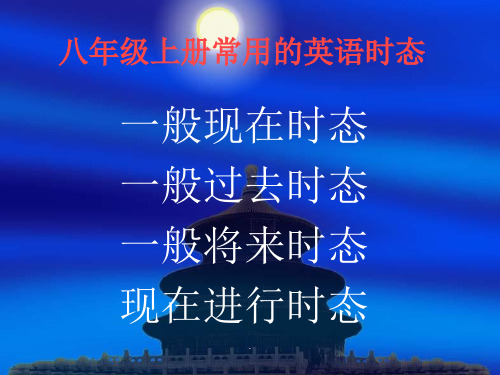
He often came to see me when I was in hospital.在我住院期间,他经常来看我。
.
二、一般过去时
谓语动词变过去式的规则: 动词情况构成方式例词一般情况加-ed : play—played, work—worked,look—looked 以 -e 结尾的动词加-d :live—lived,hope—hoped,
.
二、一般过去时
一般过去时态的否定和疑问: 1)谓语是实义动词时,要借助于助动词did We didn’t see anything wonderful yesterday . Did they finish their homework last Sunday ? She didn’t do any work this morning . When did he come to your school ? 2)谓语中有be或情态助动词时,不再另加其它助动
俩明年中学毕业。
.
三、一般将来时2) be going to +不 定式,表示将来。
a. 表示经过事先考虑与打算、按计划或安排将要发生的动作。 例如:
I ' m going to finish the report this afternoon.今天下午我将 会写完这份报告。
——What are you going to do when you grow up?长大以 后你打算干什么?
弗朗西斯穿过去,把球传给姚明,姚明跳起来,接住球投进篮里。
.
一般现在时态的几点注意:
4) 在由if, unless, even if ,so long as , as long as 等引导 的条件状语从句和在由when, before, after, until, till, as soon as, by the time, each time, the moment, immediately等引导的时间状语从句中,常用一般现在时表 示将来时间。例如:
八年级英语所学的全部时态以及语法
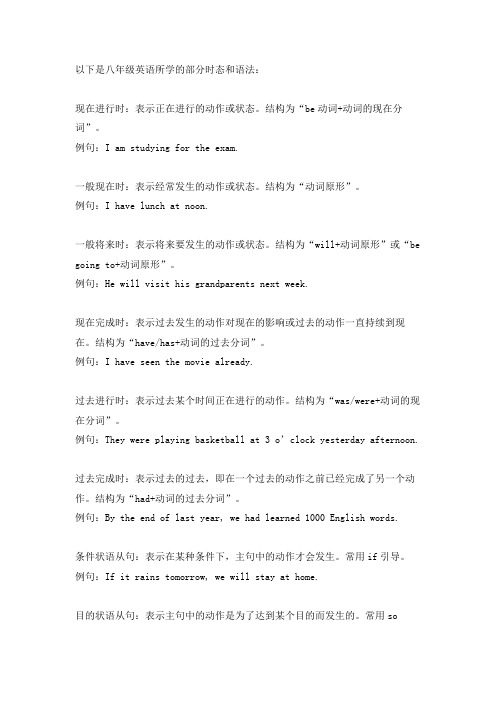
以下是八年级英语所学的部分时态和语法:现在进行时:表示正在进行的动作或状态。
结构为“be动词+动词的现在分词”。
例句:I am studying for the exam.一般现在时:表示经常发生的动作或状态。
结构为“动词原形”。
例句:I have lunch at noon.一般将来时:表示将来要发生的动作或状态。
结构为“will+动词原形”或“be going to+动词原形”。
例句:He will visit his grandparents next week.现在完成时:表示过去发生的动作对现在的影响或过去的动作一直持续到现在。
结构为“have/has+动词的过去分词”。
例句:I have seen the movie already.过去进行时:表示过去某个时间正在进行的动作。
结构为“was/were+动词的现在分词”。
例句:They were playing basketball at 3 o’clock yesterday afternoon.过去完成时:表示过去的过去,即在一个过去的动作之前已经完成了另一个动作。
结构为“had+动词的过去分词”。
例句:By the end of last year, we had learned 1000 English words.条件状语从句:表示在某种条件下,主句中的动作才会发生。
常用if引导。
例句:If it rains tomorrow, we will stay at home.目的状语从句:表示主句中的动作是为了达到某个目的而发生的。
常用sothat引导。
例句:He studied hard so that he could pass the exam.时间状语从句:表示在某个时间点发生的动作。
常用when, while等连词引导。
例句:When the teacher came in, the students stopped talking.比较状语从句:表示两个事物之间的比较关系。
初二英语动词时态试题答案及解析
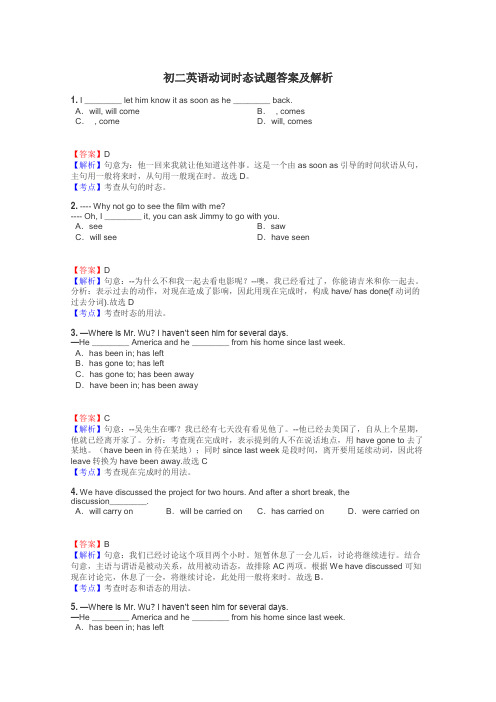
初二英语动词时态试题答案及解析1. I ________ let him know it as soon as he ________ back.A.will, will come B.×, comesC.×, come D.will, comes【答案】D【解析】句意为:他一回来我就让他知道这件事。
这是一个由as soon as引导的时间状语从句,主句用一般将来时,从句用一般现在时。
故选D。
【考点】考查从句的时态。
2. ---- Why not go to see the film with me?---- Oh, I ________ it, you can ask Jimmy to go with you.A.see B.sawC.will see D.have seen【答案】D【解析】句意:--为什么不和我一起去看电影呢?--噢,我已经看过了,你能请吉米和你一起去。
分析:表示过去的动作,对现在造成了影响,因此用现在完成时,构成have/ has done(f动词的过去分词).故选 D【考点】考查时态的用法。
3.—Where is Mr. Wu? I haven’t seen him for several days.—He ________ America and he ________ from his home since last week.A.has been in; has leftB.has gone to; has leftC.has gone to; has been awayD.have been in; has been away【答案】C【解析】句意:--吴先生在哪?我已经有七天没有看见他了。
--他已经去美国了,自从上个星期,他就已经离开家了。
分析:考查现在完成时,表示提到的人不在说话地点,用have gone to 去了某地。
(have been in 待在某地);同时since last week是段时间,离开要用延续动词,因此将leave转换为have been away.故选 C【考点】考查现在完成时的用法。
(英语)英语动词的时态练习题含答案
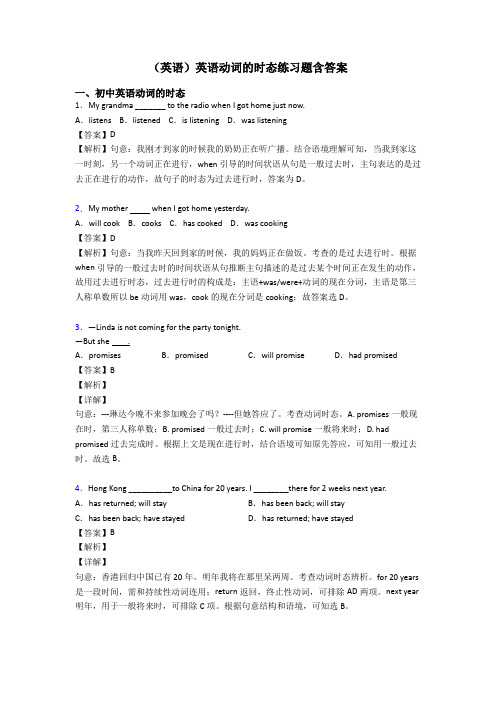
12.In the past few years, many schools ______ the ways of doing morning exercises.
A.changeB.changesC.will changeD.have changed
【答案】D
【解析】
试题分析:句意:在过去的几年里,很多学校已改变了做早操的方式。根据时间状语In the past few years可知,本题用现在完成时。故选D。
A.will take B.am taking C.was taking D.take
【答案】C
【解析】
【详解】
句意:--刚才你为什么不给我开门?--对不起,我在洗澡。根据didn't you open the door这里叙述的是过去的事情,根据句意可知该开门的时间正在洗澡,也就是说过去某个时间正在进行的动作,应该用过去进行时。过去进行时的谓语动词的形式是:was/were+doing,故选C。
15.—_____ you _____ your homework yet?
—Yes, I _____ it ten minutes ago.
A.Did; do; finishedB.Have; done; have finished
C.Have; done; finishedD.Will; do; finish
10.—Do you know _________ the meeting?
—Tomorrow morning.
A.when they had
B.when they are going to have
C.when did they have
人教版八年级英语上册时态知识总结及练习
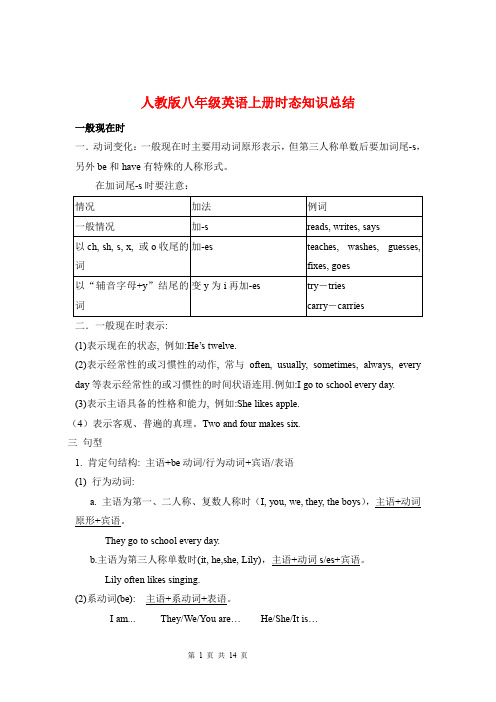
人教版八年级英语上册时态知识总结一般现在时一.动词变化:一般现在时主要用动词原形表示,但第三人称单数后要加词尾-s,另外be和have有特殊的人称形式。
在加词尾-s时要注意:二.一般现在时表示:(1)表示现在的状态, 例如:He’s twelve.(2)表示经常性的或习惯性的动作, 常与often, usually, sometimes, always, every day等表示经常性的或习惯性的时间状语连用.例如:I go to school every day. (3)表示主语具备的性格和能力, 例如:She likes apple.(4)表示客观、普遍的真理。
Two and four makes six.三句型1. 肯定句结构: 主语+be动词/行为动词+宾语/表语(1) 行为动词:a. 主语为第一、二人称、复数人称时(I, you, we, they, the boys),主语+动词原形+宾语。
They go to school every day.b.主语为第三人称单数时(it, he,she, Lily),主语+动词s/es+宾语。
Lily often likes singing.(2)系动词(be): 主语+系动词+表语。
I am... They/We/You are… He/She/It is…2.否定句结构: 主语+be动词/行为动词+宾语/表语(1) 行为动词:a. 主语为第一、二人称,复数人称时,主语+don’t+动词原形。
They don’t go to school every day.b.主语为第三人称单数时,主语+doesn’t +动词原形。
Lily doesn’t like singing.(2)系动词(be): 主语+is/am/are后加not+表语I am not a worker.3. 一般疑问句结构:(1)行为动词a. 主语为第一、二人称,复数人称时,Do+they/we/you+动词原形Do they go to school every day? (Yes, they do. No, they don’t.)b.主语为第三人称单数时,Does +he/she/iIt+动词原形Does Lily often like singing? (Yes, she does. No, she doesn’t.)(2) 系动词(be): is/am/are+主语+表语Are you a worker? (Yes, I am. No, I’m not.)4.特殊疑问句结构特殊疑问词(what, how often, which, where,who)+一般疑问句?(1)行为动词What do they do every day?How often does Peter go fishing?(2) 系动词(be):Who is the girl at that gate?一般过去时一.动词变化:一般过去时主要表示过去的动作或状态,在句中由主语+动词的过去式来表达。
人教版初中八年级英语常用语法知识——动词时态复习题(含答案解析)

一、选择题1.—I am feeling ill. What should I do?— eating junk food and breakfast every day.A.Stop; having B.Stop; have C.To stop; have. D.To stop; to have B 解析:B【解析】【分析】【详解】句意:——我感觉生病了。
我该做什么?——停止吃快餐并且每天吃早餐。
考查祈使句。
根据句意可知第二句为祈使句,动词原形开头。
stop doing sth停止做某事;have breakfast 吃早饭。
此处stop和have是并列的动词,用连词and连接。
故选B。
2.Colours can change our moods and make us happy or sad .A.feel B.to feelC.felt D.feeling A解析:A【解析】【分析】考查:非谓语动词【详解】句意:色彩可以改变我们的心情,让我们感到快乐或悲伤,充满活力或疲倦。
短语make sb. do sth. 使/让某人做某事;用省略to的不定式做宾补;故选A。
3.Here _______a nice photo of my family.A.am B.be C.is D.are C解析:C【解析】【详解】句意:这是一张我家漂亮全家福。
考查倒装和be动词。
分析句子可知,此句主语是a nice photo of my family,表单数,所以需用表单数的be动词。
故选C。
4.These chicken wings taste ________. I want more.A.well B.wonderfully C.nice D.bad C解析:C【解析】【详解】句意:这些鸡翅尝起来不错。
我想要更多。
考查感官动词的用法及形容词辨析。
well好,副词;wonderfully精彩地;nice好的;bad 坏的。
- 1、下载文档前请自行甄别文档内容的完整性,平台不提供额外的编辑、内容补充、找答案等附加服务。
- 2、"仅部分预览"的文档,不可在线预览部分如存在完整性等问题,可反馈申请退款(可完整预览的文档不适用该条件!)。
- 3、如文档侵犯您的权益,请联系客服反馈,我们会尽快为您处理(人工客服工作时间:9:00-18:30)。
人教版英语八年级英语句型及语法(英语动词的时态)及答案百度文库一、初中英语动词的时态1.--Have you been to Suning Plaza(苏宁购物中心) in our city?--No. Although it for more than a week, I'm far too busy to go there.A.has started B.has been onC.has been open D.has opened【答案】C【解析】【详解】句意:——你曾经去过我们市的苏宁购物中心吗?——没有。
尽管它开业有一周多了,但是我太忙而没有时间去那里。
和一段时间连用,动作要用延续性的或者用延续性的状态词。
open,start都是瞬间动词。
be on表示工作着,开着,一般指电器,煤气或水龙头等;be open表示开着的,营业中的;这两个词都是延续性状态,结合句意,故选C。
2.--- Where’s my father? Could tell me?--- He to Beijing. He’ll attend an important mee ting.A.goes B.is going C.has gone D.has been【答案】C【解析】【详解】句意:——我的父亲在哪里?可以告诉我吗?——他已经去北京了。
他将参加一个重要会议。
考查动词时态辨析。
根据句意语境,可知父亲不在说话的地点已经去了北京,需用现在完成时,可排除AC两项。
have been to意为“曾经去过某地”,现在已不在那里了;have gone to意为“到某地去了”,说话时作句子主语的人不在现场,故选C。
3.—What do you often do at weekends?—I often ________ my grandparents.A.visit B.visited C.have visited D.will visit【答案】A【解析】【详解】句意:你经常在周末做什么?——我经常去看我的爷爷奶奶。
考查句子时态。
A. visit 一般现在时;B. visited 一般过去时;C. have visited现在完成时;D. will visit一般将来时。
结合语境可知下文often可知是经常性动作,故用一般现在时态。
选A。
4.Not only my classmates but also our English teacher Chinese poems, so we often share their favourite ones.A.like B.liked C.likes D.liking【答案】C【解析】句意:不仅我的同学们而且我的老师都喜欢古诗,因此我们经常分享他们最喜欢的诗。
本题考查动词的时态。
A. like动词原形; B. liked 过去式;C. likes 单数第三人称; D. liking现在分词形式。
Not only···but also···不仅···而且···用于连接两个对等的成分;若连接两个成分作主语,其后谓语动词与靠近的主语保持一致。
our English teacher为单数第三人称,故选C5.-Have you washed the clothes? -Not yet. But I _________ them in half an hour. A.washed B.have washed C.will wash D.wash【答案】C【解析】句意:——你洗衣服了吗?——还没有。
但我半小时以后就洗。
In half an hour半小时后,表示的是将来时间。
故选C。
6.– Would you like to watch The Great Wall 《长城》with me?-- Certainly. I don’t mind ________ it again although I ______ it twice.A.to see, saw B.seeing, have seen C.to see, have seen D.seeing, saw【答案】B【解析】句意:——你愿意跟我去看《长城》吗?——当然了,尽管我已经看了两遍,但我不会介意再去看一遍。
mind doing sth.介意做某人,结合句意,首先排除A,C;根据"I don't mind ___ it again"和"although"可知尽管我已经看了两遍,但我不会介意再去看一遍.所以看过两遍用现在完成时,答案选B。
7.—Do you think if Tom _____the work well tomorrow?—I think he will if he ______his best.A.does, will try B.will do, tries C.does, tries D.will do, will try【答案】B【解析】【详解】句意:-你认为明天Tom是否会把工作做好?-我认为如果他尽他的最大努力,他会做好的。
does做,第三人称单数形式;will do将会做,一般将来时态;will try将会努力,一般将来时态;tries一般现在时态,第三人称单数形式。
根据句意可知,第一句话中if是“是否”,引导宾语从句,从句中有tomorrow,表示将来的事情,故用一般将来时态will do;第二句话if是“如果”,引导条件状语从句,从句中用一般现在时,主句用一般将来时态,主语是he第三人称单数,故用tries。
选B。
8.They their holidays in Paris last summerA.spend B.spentC.will spend D.are spending【答案】B【解析】句意:去年,他们在巴黎度假了。
本题考查动词的时态A. spend 花费,度过,是动词原形 B. spent 度过,是动词的过去式 C. will spend 将要度过,是将来时态 D. are spending。
正在度过,是现在进行时。
根据题意,去年度过的。
故选B。
9.Neither Amy nor her parents ______ to Australia, but _______ of them know Australian customs very well.A.have been, all B.have been, both C.has been, neither D.has been, none 【答案】B【解析】句意:艾米和她的父母都没去过澳大利亚,但他们都很了解澳大利亚的风俗习惯。
考查动词时态和不定代词辨析题。
Neither A nor B,表示两者都没有/都不,遵循就近原则;空格前面的parents(父母)是复数形式,不可用has,可排除CD两项。
all全都;both两者都,Amy和her parents是两个方面,需用both。
根据句意语境,可知选B。
10.The factory over 1200 cars a month. My car in it in 2013.A.produces,was produced B.was produced,producesC.produces,produces D.was produced,produced【答案】A【解析】【详解】句意:这个工厂每个月生产1200多辆车,我的车就是2013年在这里生产的。
根据句意可知,第一个空是主动语态,且是一般现在时,主语是the factory,故填produces; 第二个空表示“the car”被生产,且动作发生在2013年,故填was produced。
故选A。
11.— Why did so many people get hurt in the earthquake?—Don’t you know? People when it happened that night.A.slept B.have slept C.sleep D.were sleeping【答案】D【解析】句意:-为什么这么多人在地震中受伤? -你不知道吗?当晚发生的时候,人们都在睡觉。
由句子when it happened that night.可知是过去时,因此主句用过去时。
排除B/C。
再根据语境可知,地震发生的时候,人们正在睡觉。
用过去进行时。
故选D。
12.---Where is your father?---He_________ Australia and he ________Sydney for two weeks.A.has been to; has been in B.has gone to; has been inC.has been in; has been to D.has gone to; has been to【答案】B【解析】【分析】【详解】句意:——你的父亲在哪里? ——他去了澳大利亚,已经在悉尼了。
考查现在完成时态。
have/has gone to已去了某地,表示人不在说话地点; have/has been in 已在某地;have/has been to去过某地,但现在不在那里。
根据句意语境,可知不在对话的地方,ACD三项不合语境,故选B。
13.--Look! There____ so many noisy kids in the room!--Haven’t you heard the saying “When the cat is away, the mice _____?”A.have; play B.is; are going to playC.have; are playing D.are; will play【答案】D【解析】【详解】句意“-看!房间里有许多吵闹的小孩-你没听见他们在说,当猫离开后,这些老鼠在玩吗?”。
there be句型不与have连用,排除A和C,且第一空处主语为so many noisy kids,谓语用复数,排除B,第二空处when引导的从句用一般现在时,主句用一般将来时,即“主将从现”原则,故选D。
14.I don’t know how long they _____. I remember he _____ his wife on a sunny day. A.married, got married to B.married, got married withC.have been married , got married with D.have been married, married【答案】D【解析】【分析】【详解】试题分析:句意:我不知道他们结婚多长时间了。
